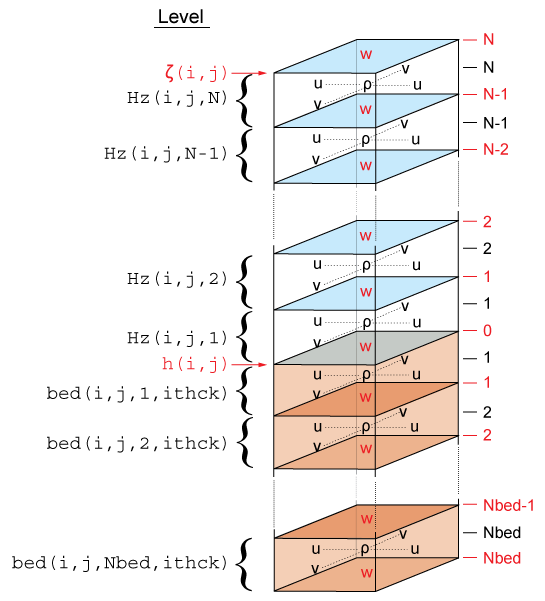Custom Query (986 matches)
Results (904 - 906 of 986)
| Ticket | Owner | Reporter | Resolution | Summary |
|---|---|---|---|---|
| #894 | Done | IMPORTANT: Updated 4D-Var observation operator | ||
| Description |
|
|||
| #895 | Done | IMPORTANT: 4D-Var observation operator - observation depths | ||
| Description |
|
|||
| #896 | Done | VERY IMPORTANT: Adding Tide Generating Forces (TGF) | ||
| Description |
I implemented the astronomical Tide Generating Forces (TGF) in ROMS 2D and 3D pressure gradient routines. They are coded in terms of the equilibrium tide (ζeq), defined as the shape that the sea surface (m) would assume if it were motionless and in equilibrium with the TGF on a fluid plane (Arbic et al., 2018). It is activated with the option TIDE_GENERATING_FORCES. It is restricted to spherical grids since we need (lon, lat) of every cell to compute the harmonic constituents parameters for the location of the Moon and Sun. We recommend activating this option in conjunction with boundary tidal forcing (SSH_TIDES and UV_TIDES). Thanks to John Wilkin for writing the implementation documentation (including equations and harmonics) and the Matlab scripts to compute the equilibrium tide offline and examine the harmonic parameters. Basically, the pressure gradient terms are of the form:
where g is the acceleration due to gravity (m/s2), ζ is the surface elevation (m), and ζeq is the equilibrium tide (m). During its implementation, I examined and tested the 3D and 2D pressure gradient algorithms in ROMS. I discovered a but in prsgrd32.h (activated with DJ_GRADPS). This issue is discussed in detail in following forum post. Two new routines were added:
Currently, there are two ways to specify the tide_start ROMS variable in an application:
TIDES_DATE - Checking tidal reference date for zero phase:
'zero_phase_date' variable not found in ../../../om/doppio_tide_7km.nc)
given tide_start = 0.0000 (days)
tide_DateNumber = 732678.0000 (2006-01-01 00:00:00)
This capability was also added to the ADM, TLM, and RPM pressure gradient routines. However, I noticed that it slows the 4D-Var algorithm convergence. I need to test in other applications. I look forward to advanced users helping us test the TGF implementation in their tide forced applications. Below are two figures that show the sea surface elevation in the center of the Gulf of Maine (top) and at the entrance of the Bay of Fundi (bottom). ROMS is configured with boundary tidal forcing, tide generating force, and inverted barometer effect in the pressure gradient. As expected, the TGF makes very small corrections to the boundary tidal forcing. It implies that the tide boundary forcing is well calibrated for this application. Users will need to activate both tidal forcings (SSH_TIDES, UV_TIDES, TIDE_GENERATING_FORCES). The ATM_PRESS is activated for all solutions. WARNINGS:
References: Arbic, B.K., Garner, S.T., Hallberg, R.W. and Simmons, H.L., 2004: The accuracy of surface elevations in forward global barotropic and baroclinic tide models, Deep Sea Research Part II: Topical Studies in Oceanography, 51(25-26), pp. 3069-3101. Arbic, B.K., Alford, M.H., Ansong, J.K., Buijsman, M.C., Ciotti, R.B., Farrar, J.T., Hallberg, R.W., Henze, C.E., Hill, C.N., Luecke, C.A. and Menemenlis, D., 2018: Primer on Global Internal Tide and Internal Gravity Wave Continuum Modeling in HYCOM and MITgcm. In: New Frontiers in Operational Oceanography, E. Chassignet, A. Pascual, J. Tintoré and J. Verron (Eds.), GODAE OceanView, 307-392, doi: 10.17125/gov2018.ch13 Doodson, A.T. and Warburg, H.D., 1941: Admiralty Manual of Tides. His Majesty’s Stationery Office, London, UK, 270 pp. Egbert, G.D. and Ray, R.D., 2017: Tidal prediction, Journal of Marine Research, 75(3), pp.189-237. |
|||



